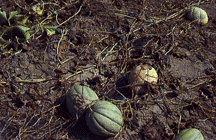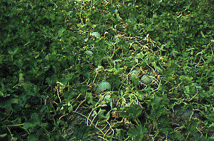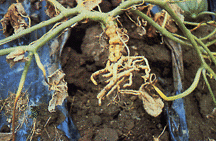Horticultural crops :: Vegetables:: Musk melon and Water melon
| Sudden Wilt
Symptoms
-
Unlike bacterial wilt, which can occur any time during the season, sudden wilt generally occurs late in the season and is closely associated with a heavy fruit load on the plant. Cucumbers and melons appear to be most sensitive to sudden wilt.
-
Initial symptoms are a slight flagging of the plants in midday even when abundant moisture is present.
-
This flagging will continue to worsen so that, by the third or fourth day, many of the plants are completely wilted.
-
Disease progression is rapid, hence the name sudden wilt. After five to six days, all of the vines have melted down and only the immature fruits are left in the fields.
-
Affected plants appear to lack feeder roots; other roots become slightly misshapen and thick.
-
Currently it is thought that sudden wilt is caused by a root rot complex involving Pythium sp., Rhizoctonia solaniand Fusarium sp. that invade the roots and further colonize the root tissue.
-
It is thought that stresses such as excess moisture and drought, prolonged periods of low temperatures (below 50 degrees F) and attack by the several viruses that commonly affect mellons and/or cucumbers individually or in combination weaken plants so that soil-borne pathogens can rapidly colonize the root systems.
Management
-
Good soil drainage and thin plant density reduces the incidence of disease.
-
Destroy diseased plant debris.
-
Soil application of T.viride @ 2.5 kg/ha with 50 kg FYM.
-
Spray Mancozeb/ Copper Oxychloride at 2.5 g /lit or Carbendazim/ Thiophanate-methyl at 1 g /lit.
|
|



